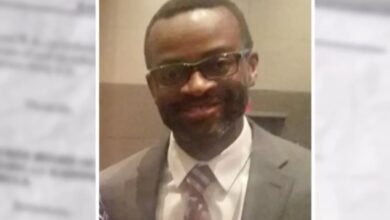
Rice Students Demand Action Following Swim Coach’s Anti-Trans Comments
The university has not yet clarified its stance on transgender athletes.

Lee Waldman grew up in a town that wasn’t accepting of their queer identity.
When they began looking to pursue higher education, it was important to find a college that supported them as a transmasculine nonbinary student. Waldman, who uses they/them pronouns, ultimately decided to attend Houston’s Rice University.
“Rice really cemented itself as a university that stands for equity and inclusion, and ensuring that all students are safe on this campus,” says Waldman, a freshman who is double-majoring in sociology and the study of women, gender, and sexuality. “That was something I was looking for in an institution.”
But Waldman’s college experience so far hasn’t lived up to their expectations. There is a lack of gender-neutral bathrooms across campus, they say, and the campus queer-resource center is student-run rather than being an official Rice program. “There is a strong LGBTQ community presence on campus that is not always supported by the university, and [our presence] is not always respected by [some] individuals on campus.”
Most recently, while browsing the web for campus news, Waldman saw several national articles about Rice swim coach Seth Huston’s anti-trans remarks while speaking out against the National Collegiate Athletic Association (NCAA)’s recent decision to update its policy regarding transgender student athletes.
On January 20, the NCAA announced that its new policy for trans athletes would be determined on a sport-by-sport basis, following the lead of an International Olympics Committee (IOC) decision last year. Previously, the IOC and the NCAA required all trans athletes to show testosterone levels of no more than 10 nanomoles per liter of serum (nmol/L) for a period of 12 months.
One day later, Huston criticized the new NCAA policy in Swim Swam.
“The NCAA governance has become a bystander waiting for other organizations to make tough decisions,” Huston told the sports publication. “Now they sit on the sidelines with transgender issues.”
The College Swimming & Diving Coaches Association of America (CSCAA), which represents and advocates for all divisions of intercollegiate swimming and diving, also voiced its concerns about the new policy, but for a different reason. CSCAA said the NCAA’s decision was “not a solution” and “missed the opportunity to lead [the] important discussion” around gender-affirming sports policies. The organization also voiced its support for trans University of Pennsylvania swimmer Lia Thomas, whose right to compete has been debated since she broke multiple records at a meet in December.
“The CSCAA is right in being frustrated with NCAA leadership or lack thereof, but wrong to suggest Lia compete at NCAAs,” Huston said, noting that Thomas has the right to compete, but not in the women’s division.
“I respect Lia Thomas, her transition, and all of that. And I am completely OK with [her having] the opportunity to compete, because that would be a Title IX issue,” he said. “But I think another thing within Title IX is that we have to be given time to accommodate, I guess you could say. Whether that is creating a third division, a transgender division, or whatever.”
Despite the fact that Thomas had been following previous regulations set by the NCAA, Huston said he believes swimmers should “compete as what you were biologically born” and that “there are ways to make opportunities for Lia without hurting a whole lot of others.”
On February 1, USA Swimming, which oversees the collegiate sport, said trans athletes competing in women’s events must show testosterone levels of no more than 5 nmol/L for at least 36 months. It is unclear whether Thomas will be able to compete in NCAA championships, which are scheduled for March.
When trans-nonbinary Rice freshman Ash (whose name has been changed to protect their privacy) learned about Huston’s comments, they “felt an immediate concern.”
Despite having an equal rights policy in place that prohibits discrimination and harassment against individuals on the basis of gender identity and expression (in addition to over a dozen other categories), Rice officials have not addressed Huston’s suggestion that trans athletes should be segregated in a separate division. A school representative told OutSmart that university president David Leebron was unavailable to comment on the issue.
Ash fears that Huston’s comments could embolden transphobia on campus if officials fail to clarify the school’s policy concerning trans athletes. “It shows that someone within the Rice community can be transphobic, and that the university takes no overt issue with the transphobic person on campus.”
Waldman agrees. “I chose Rice in large part due to its commitment to diversity, and I feel betrayed,” they say. “Not only by the fact that an employee was making such transphobic statements, but by the fact that the university has not responded with any action.”
On October 27, 2002, Rice football coach Ken Hatfield was quoted making homophobic comments in an article that appeared in the Chronicle of Higher Education. In the article, Hatfield said he would consider removing a player from his team “for being gay.”
The next day, Rice president Malcom Gillis released a firmly-worded letter of explanation and apology. He reiterated his and Hatfield’s commitment to the university’s nondiscrimination policy. Hatfield also apologized and continued to coach the Owls until 2005.
“Rice had a very quick response and reaffirmed its commitment to anti-discrimination [in 2002],” Waldman says. “This is a repeat of history, where Rice is once again on the precipice of such a decision. The question is, does the university still believe in protecting all students, no matter their identity?”
Waldman and Ash believe that Rice must take multiple steps to address Hulston’s statements, starting with public apologies from Leebron and Huston.
“Prominent members of the trans community of Houston should also be invited to come speak at Rice, ally training should once again be reevaluated, and Huston should be required to take an anti-discrimination course with a specific focus on transphobia,” Waldman says.
Ash, who has worked alongside local trans activists, says it is also important that Rice and Huston give back to the trans community. “It’s important that the university has Huston do work with the Montrose Center or another trans-specific organization, and that the university make a monetary donation to a trans organization.”
“This not only damages the trans community on campus,” they add, “but it also damages the trans community in Houston. The university should take some physical step to make up for that damage.”











Comments